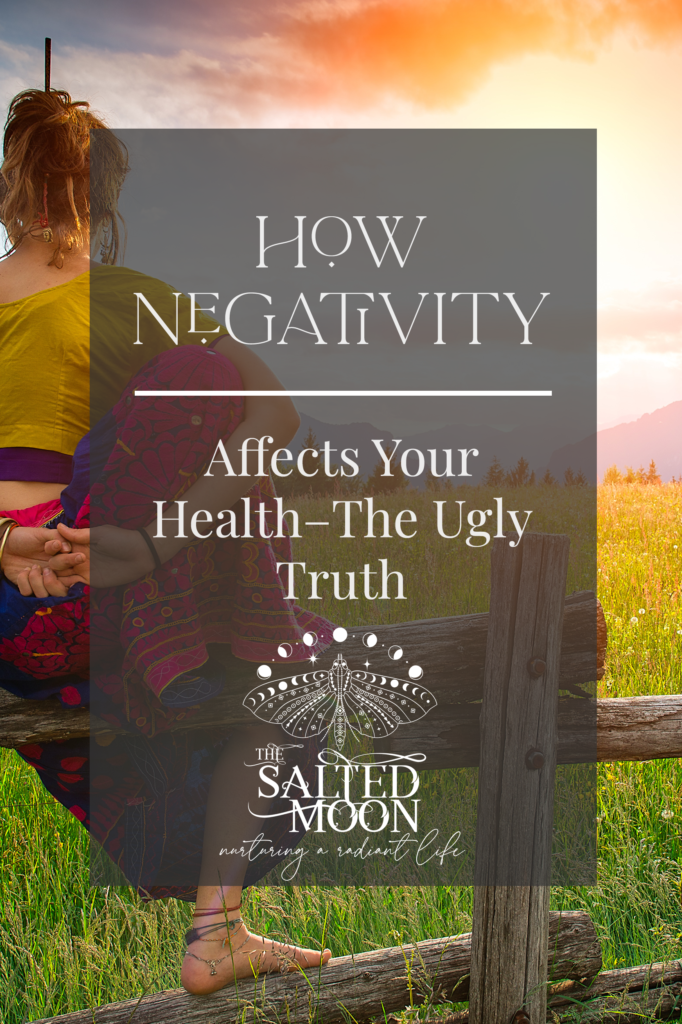Want to know the ugly truth about negativity? It’ll wreak havoc on your longevity and well-being. Let’s take a dive into how negativity affects your health.
Liar, Liar, Mind On Fire!
Most people who wallow in negative thinking proclaim loud and proud that they are realists. Waiting for the next shoe to drop or always watching their back, feels safe and prepared for the next onslaught. But is this real or is it a lie?
Often these thoughts are born out of a past experience. And usually from many years ago, sometimes so deep in our subconscious that we can’t even label what brought about this mindset to begin with.
It’s just there. In our past. Creating fear. Haunting our present and making it harder to get on with a joyful life.
Protecting ourselves is valuable, and it may have made sense to be ready for an attack on our safety at one point–whether a trauma (like an accident, house fire, abusive parent) or a chronic instability (living in poverty, having an alcoholic relative, being in a bad relationship). But even after the cause, we trained our minds to be negative.
It takes effort to realize how an old negativity isn’t useful anymore and how to change those habits. The first step is to realize it isn’t our reality anymore. Rewiring our patterns to foster more positive approaches to life takes effort and time, and often help from others.
Dwelling in the future is another way to feed the lie. We can’t predict, control or fathom all the what-ifs about the future, so living there as if it were reality is a waste of energy. Sure, it’s important to think ahead and prepare for life’s challenges–and beauty–but we can’t be stuck in worry and fear.
Reality is subjective.
Who’s right, then? Negative Ninny and Dippy Downer?[1] Or, Pollyanna?
It’s All About Mindset
One mindset will keep your body humming along in its best form (positive mindset), the other starts battles all over the nooks and crannies of your body, and ravages your health from the tip of your noggin to the squirming little toes (nasty ‘ol negative mindset).
Negativity is as human as opposing thumbs and gossip. You will have negative emotions and thoughts. In your life, you will have challenges and obstacles. Terrible situations and heartbreaks and unfair, horrible things will happen.
Dealing with these negative emotions and thoughts in a healthy way that leads to equanimity and contentment, takes practice. It’s worth every ounce of effort though.
Is it the wisest use of resources to dwell in the negative on a day-to-day, life-is-in-the-details kinda way? When all it takes is a small shift of attitude and well-being can be restored? For our health, it’s wise to step out of negativity.
You probably know someone–or are someone–no not you, nevermind–that sees the problem, the negative, the “gotcha” in every situation. This can’t be fun. But why do people do this?
Why the Negativity?
You can blame our biological programming for most of it. Thanks to the fun fact that we are not only predators but prey, we’ve been wired to look for novel situations in our environment and be hyper-alert to danger. To stay alive, we have to be on guard for possible threats of harm and death everywhere all the time.
Scientists call it negative bias. This is the idea that we respond and take to heart negative things more easily and naturally than positive things. That we are more sensitive to negative stimuli than positive.
You’ve experienced this.
Your husband calls your new skirt a cupcake skirt (true story) and you can’t let it go.[2] Research has shown that we have to have five positive experiences or interactions to balance the one negative experience. That’s five trips to Dairy Queen for one skirt comment.
Negative bias is why during political campaigns the little beasts spend more time whirling daggers at each other than focusing on the good they’ll do. Throw a heap-full of slander, and they know we’ll pay attention. We’re programmed to.
Or why people cause an accident while staring at an accident.
This is great when we have to avoid loose rocks on a cliff, and most certainly valuable when walking down a dark, dank alley in the middle of the night. (Don’t do this. Why would you do this?) But what about in our everyday world?
How Does Negativity Serve Dippy Downer?
Negative thinkers don’t want to be let down. They look at the worst side of a situation to protect themselves when the inevitable crisis happens. They don’t want to be screwed over. Caught off guard. Disappointed. It’s self-preservation.
This seems sensible, maybe, on a quick look. But as you’ll see in a moment, this is not good for your health. Yes, always wearing rose-colored glasses and ignoring warning signs, and pretending bad things don’t exist is not a good plan either.
It’s possible to be aware of when you need to protect yourself or take action to eliminate danger or overcome a challenge, but it doesn’t require a hyper-vigilance in negative-ville.
Negativity also leads to something called learned helplessness. Ugh! I just can’t because I can’t. If you don’t think you can do something, you believe there is no use trying because you’ll fail, you’re jinxed or the world will end or whatever, then you don’t even have to try. Let someone else do it or leave it undone. Whatever it is you don’t have to take action. You’re off the hook, because…you just can’t.
Sure, negativity is annoying, but what is more troubling is the toll it’s taking on your health and longevity.
How Negativity Affects Your Health
- The mind-body connection is not just fanciful pondering, research proves, again and again, the truth of what we instinctually understand. What goes on in our mind affects our body, and what happens in our body affects our mind. Negative thinking can disrupt metabolism, hormones, immunity, raise blood pressure and cause digestive issues. Heartburn, anyone?
- People who suffer from mood difficulties like depression, stress and cynicism have a higher risk of smoking and drinking and are less likely to eat healthy foods or get the movement they need. Which leads to weakened wellness.
- Negative thinking, thoughts and emotions, lead to increased cortisol levels and stress. Chronic and unmanaged stress can cause heaps of health problems.
- These higher cortisol levels decrease immune system and increase inflammation. Inflammation is the root cause of so many diseases [3] Hello! Flu, headaches, depression, anxiety, heart disease, diabetes and cancer.
- Getting scientific for a moment, negative emotions trigger the amygdala in the limbic brain and that in turn ignites your sympathetic nervous system. If your sympathetic nervous system stays “on” most of the time, that then triggers all sorts of problems. If you’re prepared to run or fight, continually, with nothing to run from or to fight with, your body becomes a mess.
- And to top off our hand-wringing foray into how negativity affects our health, a 2014 study linked cynicism with a greater risk of dementia. Even accounting for all other variables.[4] Nice. I like my brain, thank you very much.
How Negativity Affects Your Brain Health
Once you start engaging in negativity, it will invade your life. You’ll start to see regular old situations as more negative than necessary.
Stuck at a red light? Now that registers as a life-threatening event instead of a few more moments to listen to your favorite song.
When you think of something in a negative way, your brain stores that information as such. The more negative memories and experiences, the better your brain gets at storing negative emotions and thoughts.
Your brain doesn’t know if it’s true or not, but now it’s been trained to think negatively. If that wasn’t bad enough, your brain will even go back and refilm past events and attribute more negativity to them!
And as a nice double-whammy, remember your brain is wired with negative bias, and is a little sneak looking for the negative with more enthusiasm than the positive. You know, to save your bum. It’s the proverbial vicious cycle. And it’s messing with your brain and health.
Neuroplasticity and Positivity
The good news comes wrapped in pretty unicorn paper and a big pink bow. Neuroplasticity.
Scientists used to think our brains were on the fast track to Withertown once we hit our 30s. Thankfully, we now know that’s not true.
You can use the fundamentals of neuroplasticity to change the neural pathways in your brain and create new neurons. You can change your brain! Awesome!
So, by seeing life events and situations with more positivity and by changing your attitude and mindset to a positive one, you can retrain your brain to see more positives. A win-win.
And while neuroplasticity means we can strengthen the firing of our brains for better outcomes, we can also influence the expression of our DNA. Research is proving we can influence our genetic expression and make our DNA healthier, by changing our lifestyle, including our thinking patterns.[5] Wowza!
And if you need any more persuasion to find your happy spot, then think about this gem.
Positive thinking may increase your healthy longevity.
What About Your DNA?
Higher stress levels, which increase with negativity, have been shown to shorten the telomeres at the tips of our chromosomes. The telomeres are like the plastic caps on a shoelace. Cells need telomeres to divide, and once these get too short the cell dies and this promotes disease and aging.
This shortening is unavoidable, but if keeping an optimistic attitude helps extend this process, it’s another great reason to create more positive thinking habits.
Now that you know how negativity affects your health, you may become aware of how often you engage in this thinking. You are probably ready to stop negativity from poisoning your body and want to take action.
One profound way to change negative thinking patterns is to take a deep dive into a negative story you have on replay in your mind, and then rewrite it. This post–Rewrite Your Story and Change Your Life–has the nitty-gritty of this technique.
Your body, mind, and spirit connection is complex and dynamic, and there are endless ways to find better well-being. Explore Salted Moon for inspiration!

Have you seen how negativity affects your health? What are some ways you’ve been able to overcome a negative bias?
[1] I avoid Negative Nancy and Debbie Downer because that’s just not fair to all our happy Nancy and Debbie friends!
[2] I actually thought this was funny and wasn’t offended at all. It was a cupcake skirt, but if I could wrangle even one scoop of dairy-free ice cream it was worth it.
[3] https://www.health.harvard.edu/staying-healthy/inflammation-a-unifying-theory-of-disease
[4] https://www.sciencedaily.com/releases/2014/05/140528163739.htm



